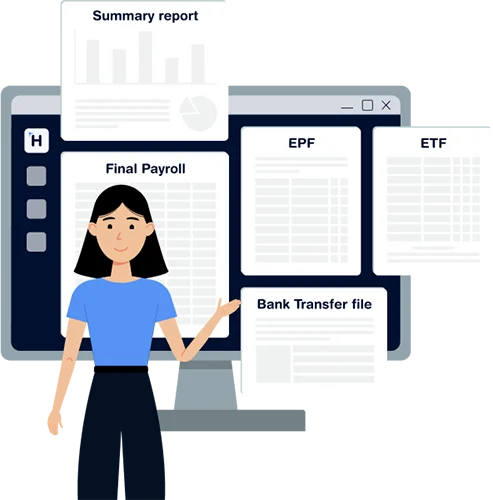Have you ever failed to meet your payroll deadlines or are you uncertain about the payroll deadlines you need to adhere to?
Mastering monthly payroll deadlines is vital for every organization, whether you’re experienced or new to payroll management. In this blog, we’ll simplify the essential deadlines for EPF/ETF, income tax (APIT) and stamp duty offering a clear roadmap for efficient and compliant payroll administration.
APIT (Income Tax): A Monthly Task
All residents are liable to income tax based on their income, and there are specific deadlines for employers and employees to make these payments. Employers are responsible for retaining and remitting all APIT amounts to the IRD each month on behalf of their employees. Failure to pay the tax within the given time frame may result in penalties.
Due Date: 15th of each Following Month
Circle the 15th of the next month on your calendar as the deadline for income tax payments. This regular commitment ensures compliance with income tax regulations and avoids penalties.
EPF/ETF: Month-End Task
The Employee Provident Fund (EPF) and Employee Trust Fund (ETF) are integral components of employee benefits, contributing to financial security and stability. Both employers and employees contribute, with a 12% contribution from the employer and an 8% contribution from the employee for EPF. Simultaneously, ETF involves a 3% contribution from the employer. Regardless of who contributed which percentages it is the Employer’s responsibility to remit all contributions to the relevant funds.
Due Date: Last Working Day of each Following Month
Plan ahead for EPF/ETF payments, as they are due on the last working day of the next month. This month-end deadline is crucial for fostering a framework that prioritizes the long-term financial well-being of employees.
APIT (Income Tax): A Monthly Task
All residents are liable to income tax based on their income, and there are specific deadlines for employers and employees to make these payments. Employers are responsible for retaining and remitting all APIT amounts to the IRD each month on behalf of their employees. Failure to pay the tax within the given time frame may result in penalties.
Due Date: 15th of each Following Month
Circle the 15th of the next month on your calendar as the deadline for income tax payments. This regular commitment ensures compliance with income tax regulations and avoids penalties.
Stamp Duty: A Monthly Task
Stamp duty, a governmental duty or payment, plays a significant role in payroll management, particularly affecting payslips categorized under “receipt or discharge for any money or other property,” subject to stamp duty. When an employee’s salary exceeds 25,000 LKR, the employer is mandated to deduct LKR 25 and remit it to the Inland Revenue Department to ensure compliance with stamp duty regulations and maintain effective payroll administration.
Due Date: 15th of the Following Month
Ensure timely compliance by marking your calendar for the 15th of the following month, the deadline for stamp duty payments.
Additionally, keep in mind that returns for stamp duty are filed quarterly, with the deadline falling on the 15th of the month following the quarter.
Tip: Initiate payments ahead of time and utilize reminders to stay on top of both payments and paperwork. This proactive approach provides a buffer and ensures a stress-free end to the month.
Conclusion
In summary, successful monthly payroll management is all about simplicity, organization, and timely execution. Break down tasks, set reminders, and explore automation options to streamline your operations. These deadlines are not roadblocks; they are signposts guiding you toward efficient payroll management. Incorporate them into your routine for stress-free and successful payroll operations. Don’t miss the next payroll deadline—stay ahead with these actionable insights!



